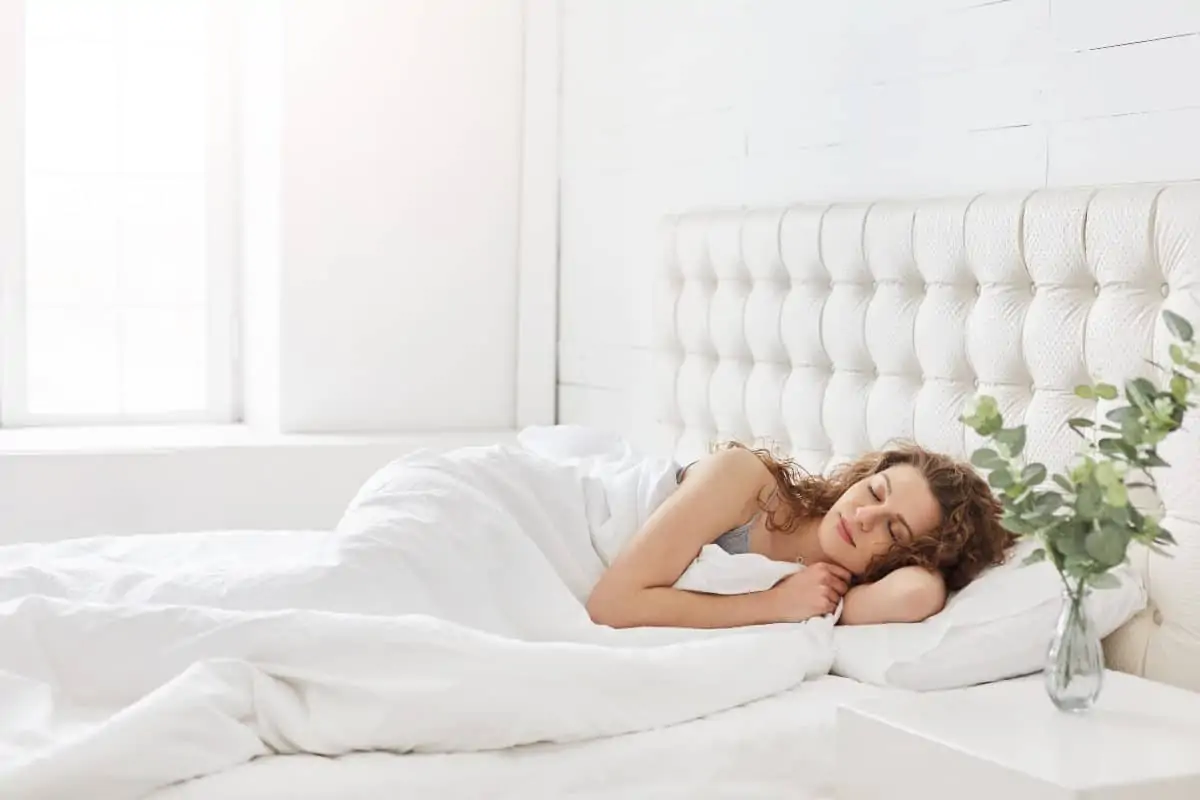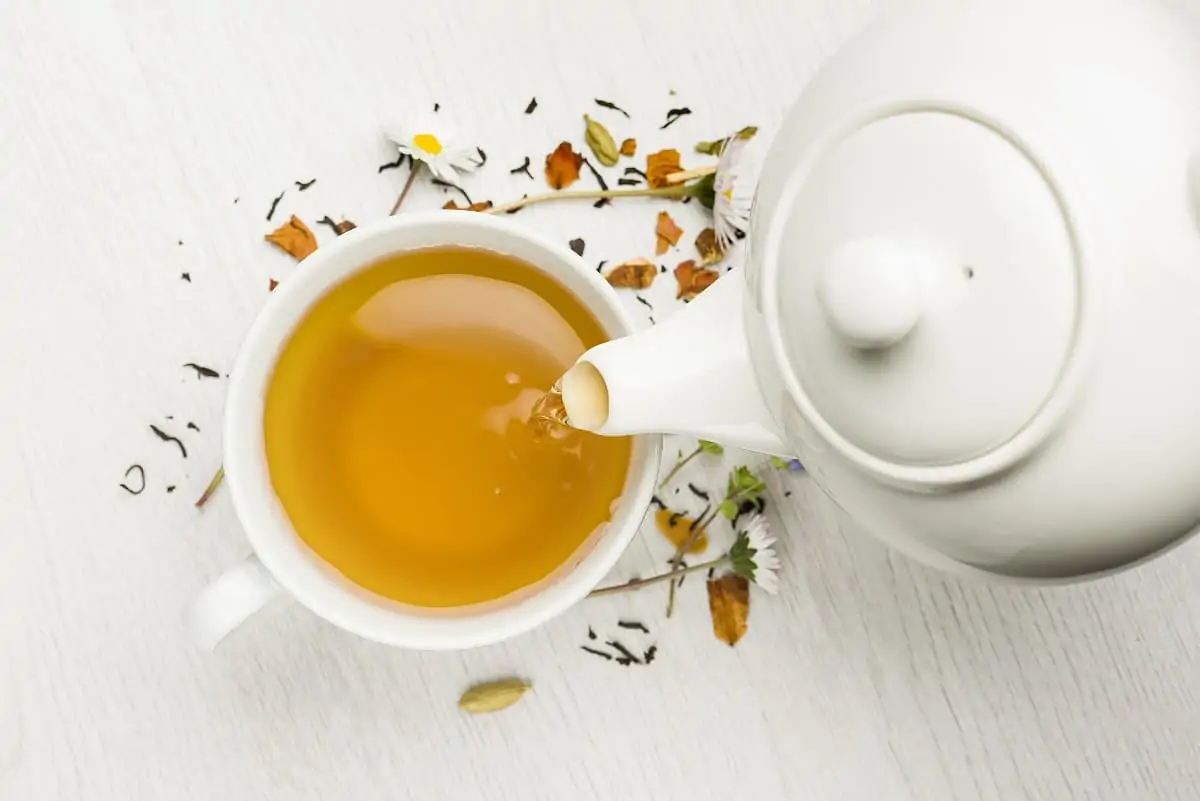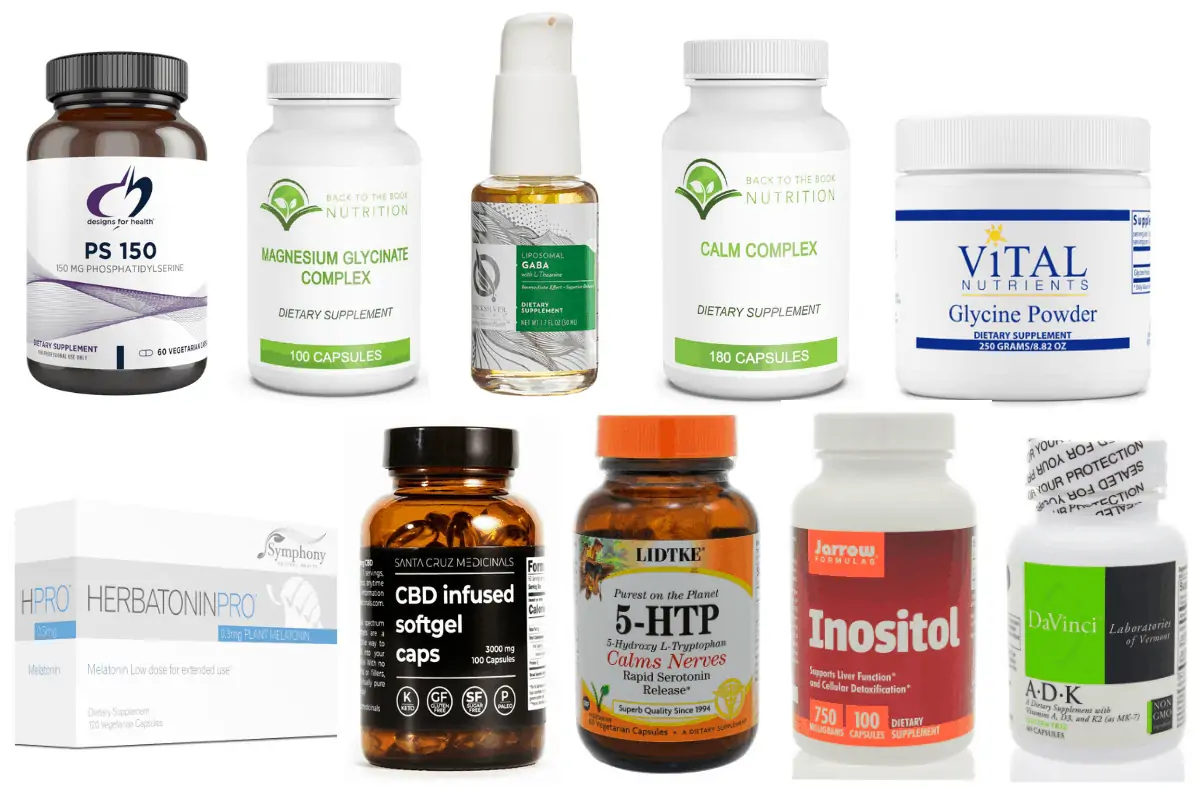Say goodbye to insomnia with these 20+ tips and supplements to help you sleep better naturally!

Note from Dena: This post was written by Lauren McNamara, Dietetic Intern, as part of a research partnership between Back To The Book Nutrition and post-graduate nutrition students from the University of Houston.
We’ve all been there before – the nightly routine of tossing and turning, checking the clock every 5 minutes, and feeling exhausted in the morning and battling afternoon fatigue. Whether you occasionally struggle to fall asleep or have insomnia, not getting enough sleep is extremely frustrating and bad for your health.
Luckily, we’ve got you covered with these natural sleep tips for when counting sheep just isn’t cutting it. Wake up feeling more rested and ready to take on your day! To learn more about why you struggle to fall asleep, check out the root causes of insomnia.
Natural Sleep Tips
1. Get morning sunlight
Research has shown that people exposed to sunlight or bright light earlier in the day produce melatonin, the hormone responsible for our sleep-wake cycle, easier and faster at night [1]. Aim for 10-30min of sunlight within a half-hour of waking up. If you can’t get outside, consider buying a 10,000 Lux LED Lightbox for this purpose.
2. Sleep in a completely dark room
Making sure your bedroom is completely dark helps your body know it’s time for sleep by triggering melatonin production [1]. Create total darkness with blackout curtains, turning off bright digital clocks, or using an eye mask.
3. Avoid screens before bedtime
One study found that reading on an iPad before bed reduced melatonin by 50% compared to reading a printed book [2]! Ideally, avoid screens entirely for 2 hours before bedtime. If this isn’t possible, used filter settings on your devices as well as blue light blocking glasses to mitigate the effects.
4. Balance your blood sugar
Keeping your blood sugar balanced throughout the day and evening can prevent overnight blood sugar drops that signal cortisol release and can wake you up. Eat balanced meals throughout the day and make sure your dinner has a moderate amount of carbohydrates (rice, quinoa, starchy vegetables, etc.), which has been linked to falling asleep faster [3,4].
If you are hungry before bed or suspect overnight blood sugar lows may disrupt your sleep, a small, nutrient-dense snack before bed may help (Greek yogurt, apples with peanut butter, mixed nuts, etc.).
Improving blood sugar control can also cut down on overnight urination, which interrupts sleep.
5. Avoid heavy meals close to bedtime
When you lay down for bed, you shouldn’t feel overly full or uncomfortable. Avoid any ‘trigger’ foods that cause bloating or GI pains (fried foods, spicy, dairy for some). Also, people prone to acid reflux should avoid lying down until 2-3 hours after a meal to avoid heartburn or nausea.
6. Eat foods that promote melatonin
Foods that contain serotonin or melatonin may promote sleep, but need more research to know for sure. In the mean time, there’s no harm in adding these to your diet.
- Tryptophan-containing foods like fish, milk, chicken, and eggs. Tryptophan is an amino acid that encourages our body to produce melatonin.
- Tart Cherry is naturally high in melatonin – 1 cup of tart cherry juice has 0.135 micrograms of melatonin.
- Kiwi is rich in serotonin, a hormone that regulates sleep and is converted into melatonin.
7. Avoid afternoon caffeine
Although caffeine brings an immediate burst of energy, it also affects hormones that disrupt the sleep-wake cycle for many hours after consumption [4]. Avoid afternoon caffeine and, if you’re more sensitive to the effects of caffeine, you may need to avoid it altogether.
A grande cup of coffee at Starbucks has 270 mg of caffeine. Try these lower-caffeine alternatives:
- Matcha Latte: 55 mg
- Decaf Coffee: 2 mg
- Black Tea: 40 mg
- Herbal Tea: 0 mg
- Kombucha: 15 mg
8. Limit evening fluid intake
Hydrate well throughout the day, but consider avoiding drinking any liquids after dinner so you’re less likely to wake in the night to urinate.
9. Don’t drink alcohol before bed
Although alcohol can be calming initially, it has a “rebound effect” when it’s out of your system which causes more sleep disruption throughout the night [5]. To avoid the nighttime disruptions, enjoy an evening drink with dinner, but not later.
10. Get regular exercise…but not at night!
Exercising regularly can significantly improves sleep patterns and mood. A meta analysis found that cardio, strength training, and meditative practices were all linked to better sleep [6].
However, vigorous exercise in the late afternoon or evening can raise the stress hormone cortisol, making it difficult to fall asleep at night. If you already struggle with stress management or high cortisol, try lighter forms of movement like walking and recreational swimming.
11. Try not to nap
For most people, napping – especially longer afternoon naps – reduces “sleep pressure” later in the evening, so you feel less tired and have a harder time falling asleep. If you do need to nap, neuroscientist and sleep expert Dr. Matthew Walker, PhD suggests doing it earlier in the day and limiting it to no more than 20 minutes.
12. Go sleep and wake up at the same time every day
This helps your body to become familiar with what time it needs to start turning on and off – forming that circadian rhythm that we talked about earlier. Think of it as “sleep training” your body. The more often you wake up and go to sleep around the same time, the easier it will be.
13. Create a calming bedtime routine
Get relaxed before bed to help prepare your brain and body for rest! Switch off brighter overhead lights and use low, warm lamplight. Try hot baths (can Epsom salts for extra magnesium), a nourishing skincare routine, stretching/foam rolling, journaling, prayer, or reading (books, not screens!).
14. Turn down the thermostat
Your body temperature and bedroom temperature also affect how fast you drift off. Set your thermostat to the mid-to-upper ’60s as this has been shown to improve sleep over warmer settings.
15. Try relaxing essential oils
Aromatherapy can help your mind relax and remind your body it’s time for bed. Lavender has been shown to increase the overall quality of sleep [7], but choose whatever scents make you feel relaxed.
16. Consider mouth taping
Placing a small piece of nursing tape over just the center of your lips (not across your entire mouth) while you sleep can help decrease mouth breathing and snoring. Nasal breathing leads to better oxygen flow and less morning tiredness [8].
If you have trouble breathing through your nose, consult with your provider first to be sure this is safe for you.
17. Do some deep breathing
Deep breathing methods can help physically slow your nervous system, which calms down the whole body. Various deep breathing methods will work, but many benefit from 4-7-8 breathing: inhale while you count to 4, hold your breath for 7 counts, and exhale as you count to 8.
18. Balance your hormones
A drop in estrogen or progesterone can cause insomnia by disrupting temperature regulation, cortisol rhythm, and/or neurotransmitters like serotonin and GABA.
If your sleep troubles started during a season of hormonal shifts (puberty, pregnancy, postpartum, going on or coming off the pill, perimenopause, menopause, etc.), or follow your monthly cycle, it’s more likely your hormones are at play.
Take this free hormone quiz to learn whether you have a hormone imbalance or work with a practitioner like Dena to test your hormones and support natural hormone balance.
19. Fix your thyroid
If you suspect you have or know you have thyroid imbalances, correcting these can help you get better sleep! Find out which thyroid tests you need to evaluate thyroid function here (and no, TSH is not enough!).
20. Avoid shift work if possible
Studies show that taking melatonin, adjusting light exposure, taking naps, and other efforts to influence sleep and circadian rhythm can help you better adapt to shift work (night shift, swing shift, etc.), but can’t fully overcome the longer term health risks associated with alternative work schedules. Our society needs shift workers but, if you have severe insomnia and related health concerns, consider changing to a job with more traditional work schedule or that at least allows shift rotations. [21]
21. Ask your doctor about medication adjustments
If you take one of the many medications that can interfere with sleep (statins, corticosteroids, decongestants, or one of the others listed at the end of this post), talk with your doctor about timing of your dose or switching to an alternative that may help you rest better.
22. Take sleep disrupting supplements earlier in the day
B vitamins, Vitamin D, Ginseng, and a number of other supplements listed at the end of this post may disturb sleep. For most, taking them in the earlier part of the day can help.
23. Get evaluated by a sleep specialist
If you’ve tried everything and still have trouble sleeping, getting evaluated by a doctor or other practitioner who is a certified sleep specialist may be a good idea.
24. Consider sleep supportive supplements
Amount of research to support the use of these products to help sleep varies. Definitely do your own research and discuss with your provider before trying new supplements.
- Magnesium: Lower intake of magnesium (and other nutrients) was linked to significantly shorter and poorer sleep among adults in one study [12]. Other studies have found insignificant improvements in sleep parameters when magnesium supplementation is used [13, 14]. Magnesium is a natural muscle relaxer, so may be especially helpful for those with muscle tension or twitching (glycinate, bis-glycinate, or threonate versions are ideal).
- Vitamin D: can improve the overall quality of REM sleep, especially if deficient in Vitamin D. Vitamin D can be stimulating for some so take it earlier in the day if you feel it disrupts sleep and consider increasing magnesium intake which may help counter its stimulating effects [9].
- Glycine: An amino acid that can have a calming effect on the brain and improve sleep quality if taken before bed [9].
- Inositol: 2 grams Inositol (+200 mcg folic acid) significantly improved sleep duration and quality in pregnant women [15]. Inositol improves blood sugar management, so may be especially suited to those whose sleep troubles are linked to poor blood sugar control.
- Phosphatidylserine (PS): Lowers cortisol, so may be most helpful in those for whom high nighttime cortisol disrupts sleep. At least one human study showed significantly better sleep quality ratings when subjects were given PS before bed [16].
- Melatonin: Melatonin is more helpful for falling asleep than helping you stay asleep [9]. Consider starting with lower doses around 0.3 mg that match your body’s normal levels and work up gradually only if needed.
- CBD: reduces pain and inflammation and has been shown in at least one human study to decrease anxiety and improve sleep in the majority of participants [17]. More study is needed to clarify dosing and verify sleep related benefits of CBD alone (versus products that include other cannabinoids like THC, etc.)
- Tryptophan* or 5-HTP*: this amino acid is a precursor to serotonin, and has been linked to preventing sleep terrors and disordered sleeping [10].
- L-Theanine*: promotes sleep through relaxation rather than sedation or drowsiness [11].
- GABA*: GABA is a calming neurotransmitter and many sleep medications work on GABA receptors in the brain. Studies have used a variety of doses, but those using high doses (100-300 mg), especially before bed and when taken for at least 1 week, suggest GABA can help people fall asleep more quickly and rest better during the first half of the night [18].
- Taurine*: Increases GABA activity, which could help promote relaxation and sleep, but studies in humans haven’t been done [19].
- Calming herbs like valerian, passionflower, magnolia, and ginseng: These support the stress axis and have been shown to improve sleep duration and/or quality. Can be taken in tea, tincture, or capsule form [20].
* If you take prescription medications for mood disorders, seizures, or insomnia, check with the physician who prescribes your medication before taking these.
About the Author:
Lauren McNamara is currently a dietetic intern at the University of Houston. She graduated from the University of Texas at Austin with a degree in nutrition and child-family development. Lauren has a strong interest in maternal and infant nutrition, as well as helping families develop healthy habits. In her free time, she enjoys cooking, baking, and running.
Disclaimer: Information on this site is intended only for informational purposes and is not a substitute for medical advice. Always consult with a trusted healthcare provider before implementing significant dietary change. Read additional disclaimer info here.
References:
Read More







So many great tips for better sleep. Thanks for sharing.
I have such a hard time sleeping. I’ll have to try these ideas!
I am fascinated by the idea of mouth tape. My husband is a avid snoring person and we’ve been trying different things.
It’s such a simple (and cheap) solution for many. Hope it works for your husband too!
These tips are great, I’ve done a lot of them and they definitely help!
Sleeping well is underestimated than how fundamental it is for psycho-physical health. I really appreciated your suggestions, excellent mix of simple gestures and supplements to use ad hoc.
As a person who cannot sleep properly these tips are really great and helpful for me. Thanks for sharing!
We all want to sleep better naturally. Thank you for these tips. I will think about taking supplements
Caffeine has ruined my sleep on so many occasions. Thanks for the tip to stay away from it.